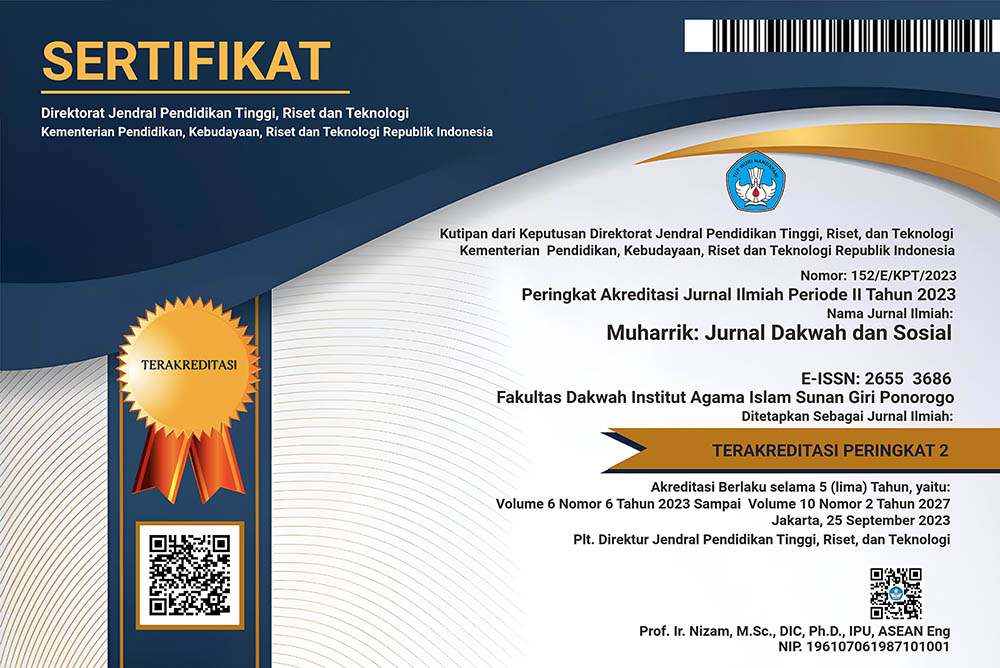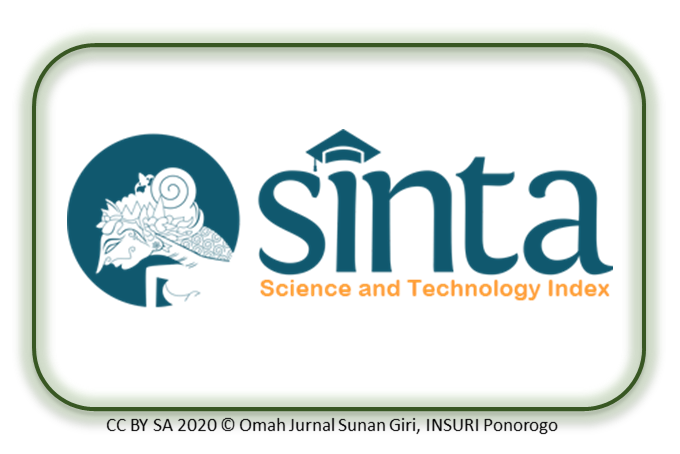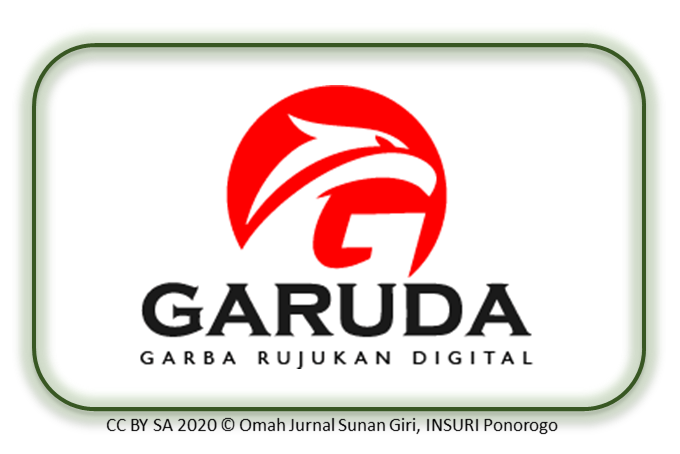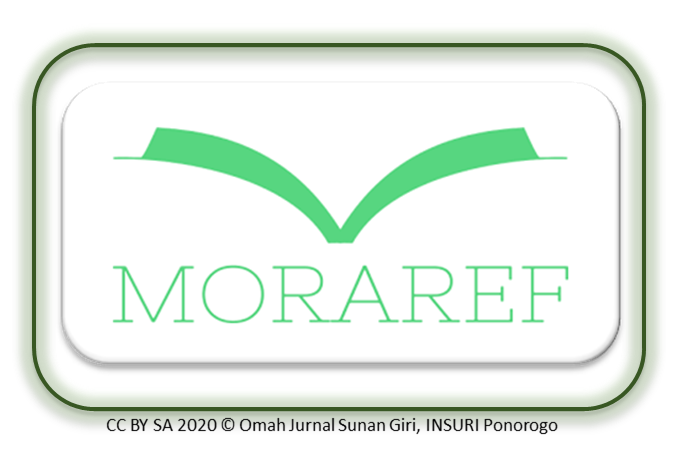Curative Da’wah as Psychospiritual Intervention: An Islamic Spirituality-Based Approach to Drug Addiction Rehabilitation in Indonesia
Keywords:
curative da'wah, addiction recovery, Islamic spirituality, drug rehabilitation, psychospiritual approachAbstract
This study examines the role of curative da'wah as a psychospiritual intervention in the rehabilitation of drug addicts within an Islamic spirituality-based framework. While drug abuse in Indonesia is increasing, little research has explored how da'wah, traditionally associated with religious preaching, can be adapted into a therapeutic approach addressing the spiritual and psychosocial needs of recovering addicts. The research was conducted at the House of Serenity Rehabilitation Center in Bandar Lampung using a descriptive qualitative approach with an intrinsic case study design. Data were collected through in-depth interviews, participant observation, and document analysis involving 15 participants, including former addicts, spiritual mentors, and program managers. The analysis, guided by the Miles & Huberman interactive model, revealed three main findings: (1) structured curative da'wah sessions combining ritual, reflection, and mentoring; (2) significant changes in participants' spiritual orientation and interpersonal relationships, with 80% reporting stronger meaning in life and no relapse during the study period; and (3) empathetic communication that fosters trust, emotional resilience, and identity reconstruction. These results suggest that curative da'wah can serve as a complementary, context-specific strategy for holistic addiction recovery, with potential application in community-based and spiritually grounded mental health programs.
References
Abdullah, M. (2019). Islamic psychospiritual therapy. Jakarta: Pustaka Al-Hikmah.
Abu-Raiya, H., & Pargament, K. I. (2011). Empirically based psychology of Islam: Summary and critique of the literature. Mental Health, Religion & Culture, 14(2), 93–115. https://doi.org/10.1080/13674670903426482
Alavi, M., Sharifi, M., & Zarean, M. (2021). The effectiveness of Islamic spiritual therapy on resilience and quality of life in recovering drug addicts. Journal of Religion and Health, 60(4), 2398–2413. https://doi.org/10.1007/s10943-020-01065-2
Badaruddin, M., & Kholil, M. (2025). Laporan tahunan BNN: Strategi nasional pemberantasan narkoba. Badan Narkotika Nasional Republik Indonesia.
Borras, L., Mohr, S., Brandt, P. Y., Gillieron, C., Eytan, A., & Huguelet, P. (2020). Religious beliefs in schizophrenia: Their relevance for treatment adherence. Schizophrenia Bulletin, 46(1), 152–161. https://doi.org/10.1093/schbul/sbz056
Chen, C. Y., Dormitzer, C. M., & Anthony, J. C. (2004). Religious involvement and drug use among youth in the United States. Drug and Alcohol Dependence, 74(1), 51–56. https://doi.org/10.1016/j.drugalcdep.2003.11.007
Cichocka, A. (2016). Understanding defensive and secure in-group positivity: The role of collective narcissism. European Review of Social Psychology, 27(1), 283–317. https://doi.org/10.1080/10463283.2016.1202248
Erikson, E. H. (1959). Identity and the life cycle. New York: International Universities Press.
Farmawati, D. (2019). Rehabilitasi pecandu narkoba berbasis pesantren: Studi kasus di Pesantren Inabah. Jurnal Dakwah dan Pengembangan Masyarakat, 17(2), 112–130. https://doi.org/10.1234/jdpm.2019.17.2.112
Fixsen, D. L., Naoom, S. F., Blase, K. A., Friedman, R. M., & Wallace, F. (2005). Implementation research: A synthesis of the literature. Tampa: University of South Florida.
Frankl, V. E. (2006). Man’s search for meaning. Boston: Beacon Press.
Garland, E. L., Farb, N. A., Goldin, P. R., & Fredrickson, B. L. (2015). Mindfulness broadens awareness and builds eudaimonic meaning: A process model of mindful positive emotion regulation. Psychological Inquiry, 26(4), 293–314. https://doi.org/10.1080/1047840X.2015.1064294
Khotimah, N., & Kushardiyanti, R. (2022). Pemulihan identitas spiritual mantan pecandu narkoba pasca-rehabilitasi. Jurnal Psikologi Islami, 9(1), 75–90. https://doi.org/10.1234/jpi.v9i1.75
Koenig, H. G. (2012). Religion, spirituality, and health: The research and clinical implications. ISRN Psychiatry, 2012, 278730. https://doi.org/10.5402/2012/278730
Koenig, H. G. (2022). Religion, spirituality, and health: A review and update. Advances in Mind-Body Medicine, 36(1), 13–22.
Ladesvita, F., Rizqiana, N., & Asfia, D. A. (2023). Layanan konseling bagi korban penyalahgunaan narkoba pada generasi muda. Jurnal Bela Negara, 9(1). https://ejournal.upnvj.ac.id/jbn/article/view/5220
Mardalena, E., Syahputra, D., & Ramadhan, H. (2025). Dakwah empatik dalam rehabilitasi narkoba: Studi terhadap pendekatan spiritual di lembaga pemulihan. Jurnal Komunikasi dan Dakwah, 13(1), 1–18. https://doi.org/10.1234/jkd.2025.13.1.1
Mardalena, R., Shofiah, V., & Rajab, K. (2025). Drug prevention, curative and rehabilitation in Islamic psychology. SALIHA: Jurnal Pendidikan Agama Islam, 4(1). https://www.staitbiasjogja.ac.id/jurnal/index.php/saliha/article/view/1628
Maté, G. (2010). In the realm of hungry ghosts: Close encounters with addiction. Berkeley: North Atlantic Books.
Maulana, R. (2020). Dakwah sebagai terapi spiritual: Relevansi sufisme dalam penyembuhan mental. Jurnal Ilmu Dakwah, 41(2), 105–120. https://doi.org/10.1234/jid.v41i2.105
Maulana, U. (2020). Spiritual sebagai terapi kesehatan mental perspektif tafsȋr Al-Qur'an (Studi kasus penyembuhan pecandu narkoba di Madani Mental Center) [Skripsi, PTIQ Jakarta]. PTIQ Repository. https://repository.ptiq.ac.id/id/eprint/73/
Miles, M. B., Huberman, A. M., & Saldaña, J. (2020). Qualitative data analysis: A methods sourcebook (4th ed.). Thousand Oaks, CA: Sage Publications.
Musyrifin, A., Sulaiman, I., & Nur, S. (2023). Efektivitas pendekatan religius dalam pemulihan pecandu: Studi kasus IPWL Cipta Wening. Jurnal Rehabilitasi Sosial, 7(1), 55–71.
Neff, J. A., & MacMaster, S. A. (2005). Spiritual mechanisms underlying substance abuse behavior change in faith-based recovery programs. Journal of Social Work Practice in the Addictions, 5(3), 33–54. https://doi.org/10.1300/J160v05n03_03
Neff, J. A., & MacMaster, S. A. (2020). Spiritual mechanisms in faith-based substance abuse treatment. Journal of Social Service Research, 46(2), 164–178. https://doi.org/10.1080/01488376.2019.1570012
Nurhaeni, T. (2023). Spiritualitas dan pemulihan: Studi komparatif metode religius dan kognitif dalam terapi adiksi. Jurnal Psikologi Sosial, 18(2), 98–114.
Nurhaeni, H. (2023). Pengaruh ulama pada penatalaksanaan interprofesional kolaborasi (Studi kasus penanganan ODGJ di Aceh) [Tesis, UIN Jakarta]. UIN Repository. https://repository.uinjkt.ac.id/dspace/handle/123456789/65673
Pargament, K. I. (1997). The psychology of religion and coping: Theory, research, practice. New York: Guilford Press.
Rusmana, N., & Ali, S. (2022). Relapse pada mantan pecandu: Kegagalan pemulihan tanpa dimensi spiritual. Jurnal Kesehatan Mental Islami, 6(1), 22–34.
Substance Abuse and Mental Health Services Administration. (2014). SAMHSA’s concept of trauma and guidance for a trauma-informed approach. Rockville, MD: U.S. Department of Health and Human Services.
Suprapto, N. (2022). Bahan ajar keperawatan paliatif: Pendampingan spiritualitas pasien dan keluarga. ResearchGate. https://www.researchgate.net/publication/359399988
Syafifah, N. (2022). Pendekatan sufistik dalam dakwah kuratif: Relevansi dengan penyembuhan trauma psikis. Jurnal Studi Agama dan Psikologi, 5(1), 45–61.
Syafifah, A. N. (2022). Metode terapi syahadat dan alam bagi penderita gangguan jiwa di Majelis Nur Hasan [Skripsi, UIN Saizu]. UIN Saizu Repository. https://repository.uinsaizu.ac.id/31418/
Tohari, M. A., & Nugraha, A. (2025). Bimbingan spiritual dalam membentuk resiliensi korban penyalahgunaan narkotika. WISSEN: Jurnal Ilmu Sosial dan Humaniora, 5(2). https://journal.appisi.or.id/index.php/wissen/article/view/1078
Tohari, R. (2025). Keterbatasan pendekatan teknokratik dalam rehabilitasi narkoba: Kritik terhadap model medis konvensional. Jurnal Sosial dan Kesehatan, 12(1), 77–92.
Yin, R. K. (2018). Case study research and applications: Design and methods (6th ed.). Thousand Oaks, CA: Sage Publications.
Youssef, J., & Deane, F. P. (2021). Faith-based and secular residential addiction treatment: A comparative study of client outcomes. Substance Use & Misuse, 56(3), 422–431.
Downloads
Published
Issue
Section
License
Copyright (c) 2025 Ahmad Hadi Setiawan

This work is licensed under a Creative Commons Attribution-NonCommercial 4.0 International License.
The author(s) retain/s the copyright and grant/s Muharrik: Jurnal Dakwah dan Sosial the first publication rights licensed under the Creative Commons Attribution-NonCommercial 4.0 International (CC BY-NC 4.0) , which allows others to access (search, read, download and quote), share (copy and redistribute the material in any media or format) and adapt (mix, modify and develop) works for legitimate non-commercial purposes, with recognition of the authorship of the work and its initial publication in this journal.












